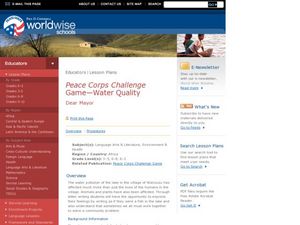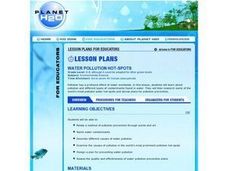Safe Drinking Water Foundation
Types of Water Pollution
In groups, young environmentalists investigate water samples that are contaminated with different types of pollutants. Each group presents their findings to the class and fills out the "Types of Pollutants Chart." This instructional...
Safe Drinking Water Foundation
Demonstration of Water Pollution
In this teacher-led demonstration, your young environmentalists will observe and record how different types of water pollutants look when they are combined. From here, individuals will develop a hypothesis on how the water can be...
Safe Drinking Water Foundation
Water Pollution
An introductory lesson to a unit on water pollution, young environmentalists are asked to brainstorm examples of pollutants in water. This lesson will help develop a sense of what water pollution is and where the pollutants come from.
National Institute of Open Schooling
Water Pollution
Fifteen million children under the age of five die each year due to diseases in their drinking water. Water pollution is the topic of lesson 34 in the series of 36. Scholars, through reading and discussing, study numerous aspects of...
Safe Drinking Water Foundation
Make Your Own Water Pollution
Using the polluted water that was made in the prior lesson, your young environmentalists will mix pollutants together in an experiment. Then, they will design a water filter that will clean the polluted water to use in the next lesson....
Safe Drinking Water Foundation
Cause and Effect of Water Pollution
Your students will become aware of and be able to list the major types and sources of water pollution. Being able to recognize that the household, agriculture, and industry sectors of society contribute to water pollution, is the main...
Safe Drinking Water Foundation
How Water Pollution Is Cleaned Up
As a follow-up from the previous instructional activity, young environmentalists discuss the benefits of water filtration and whether or not it's the best option. Other alternatives including air stripping, bioremediation, and...
Curated OER
The Wonders of Water - Biology Teaching Thesis
Students name 3-5 aesthetic values of the Potomac River. They state the importance of water in their own words. Students describe what Earth Day is and why it is important. They list 5-7 ways that they can help minimize water pollution.
Curated OER
Peace Corps Challenge Game- Water Quality
Students advocate for clean water. In this water pollution lesson, students play the Peace Corps Challenge Game, discuss the effects of polluted water and write a letter to the mayor of Wanzuzu highlighting the situation of the fish's...
Marine Institute
Water Pollution
Sixth graders investigate the various types of pollutants found in water and ways to help prevent water pollution. Through a hands-on experiment, students create samples of polluted water by mixing water with vegetable oil, dirt, and...
Teach Engineering
Introduction to Water Chemistry
What are the issues surrounding water quality? Viewers of this short presentation gain information about the importance of clean water, the lack of fresh water, water contamination, and ways that engineers treat water.
Curated OER
Effects of Water Pollution on Aquatic Organisms
Students investigate water pollution. They develop an understanding of the behavior of organisms, of the structure and properties of matter, and of natural and human induced hazards by conducting lab tests. They present their data...
Curated OER
Pollution
Young ecologists investigate some of the many ways that human activities adversely affect the environment. After identifying the main types of pollution (air, water, soil), 3rd graders fill in a Venn Diagram by pasting cut-out pictures...
Curated OER
Who Polluted the River?
Study the impact of water pollution. A hands-on experiment and an interactive story about water pollution are the basis for the learning experience.
Curated OER
Water Filtration
In this water pollution and filtration lesson plan, 5th graders read the story 'Saving Salila's Turtle' and discuss the impact pollution has had on the Ganges river. Students work in groups to brainstorm different types of water...
US Environmental Protection Agency
Non-Point Source Pollution
Investigate the different types of pollution that storm drain runoff carries into oceans, lakes, rivers, and streams with this class demonstration. Using an aquarium and an assortment of everyday items that contaminants like motor oil,...
Curated OER
The East Fork Project
Students identify possible sources of health risks, types of exposures, routes of exposure, and populations that could be affected after discussing water pollution and environmental health hazards. After discussion, students conduct a...
Curated OER
Water Pollution Hot-Spots
Students complete internet research in small groups to identify types of water pollution, spotlight water pollution hot-spots, and design a plan for water prevention.
University of Florida
Protecting Our Water Resources
Teach young environmentalists to protect their planet's resources with a set of interactive experiments. Kindergartners and other youngsters learn about watersheds and the water cycle, while older elementary learners focus on fertilizer...
Curated OER
Point- vs. Non-point Pollution
Students differentiate between point and non-point pollution and determine how the different types of pollution are harmful to aquatic ecosystems. They complete a series of tests on a sample of "polluted" water and a sample of "pure" water.
US Environmental Protection Agency
Role of Plants in Water Filtration
Investigate the amazing ability of plants to filter contaminants from water with this series of in-class demonstrations. After placing six small, potted plants in plastic cups, different solutions and mixtures are poured into them that...
Curated OER
WATER HERE AND THERE
Introduce the topic of water conservation with a little drama. Dressed as snowflakes, hail stones, or rain drops class members dramatize the events in a narration of the water cycle. The series of lessons that follow focus on...
Curated OER
Pollution in the Air and the Water Pollution Solution
Students explore air pollution. In this ecology and air pollution instructional activity, students perform an experiment in which a Vaseline coated lid is placed inside and outside the classroom. Students make predictions and then record...
Curated OER
Water Pollution
Get your scientists engaged in both recall and life application responses after reading a selection from a McGraw Hill science text (not included). Based on chapter 14, this water pollution learning exercise has students review where...

























